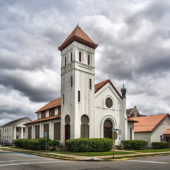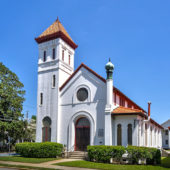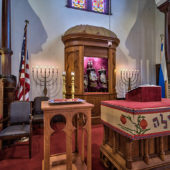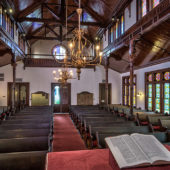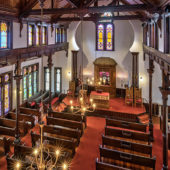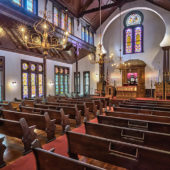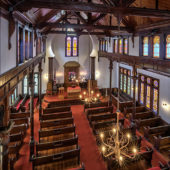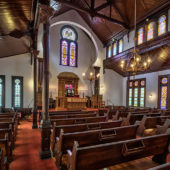One of very few surviving pre-1900 United States synagogues continuously in use.
Jewish history in Coastal Georgia is documented to 1733 when a ship carrying 42 Jews docked in Savannah just five months after General James Oglethorpe founded the colony. Oglethorpe not only allowed Jews, who arrived unexpectedly, to stay, but more importantly, he provided them full colonial rights. These rights included owning land, bearing arms, serving in the militia and eventually holding official positions of trust and authority within the colony.
Temple Beth Tefilloh was organized in the Hannukah season of 1886 by 21 men. On November 7, 1890, Rabbi Isaac Mayer Wise, founder of Reform Judaism in America consecrated the building that had cost $5,000. Over the years Beth Tefilloh’s congregation has fluctuated between twenty two original members to around 60 member families in the 1960s.
The Temple, whose name means House of Prayer, was designed in 1889 Jewish architect Alfred Eichberg who also designed the Brunswick city hall and synagogue in Sumter South Carolina. Other noteworthy commissions included F. Rheinstein and Company Building (North Carolina(, the New Hanover County Courthouse (North Carolina(. He partnered with Calvin Fay to form Fay and Eichberg (1881-1888(. They designed small buildings for the International Cotton Exposition (1881( in Atlanta and obtained larger commissions in Atlanta and Savannah including the Atlanta Chamber of Commerce Telfair Hospital, and Central of Georgia Railway building (now called Eichberg Hall(.
Architectural Historian Richard Funderburke wrote “I am pretty sure he was the first Jewish professional architect to maintain a practice in Georgia, and probably in the Deep South. It is my contention that he led the way for Jews in this profession in the South.”
In 2013 Rachel Bregman joined Temple Beth Tefilloh as the first rabbi of Temple Beth Tefilloh to reside full-time in Glynn County in half a century and the first female rabbi in the Temple’s history. It is unique for a congregation of only 54 families to have a full-time rabbi. This dynamic rabbi now serves on the boards of Truah (formerly Rabbis for Human Rights(, The Jewish Community Relations Council, and is a founding member of Tzedek Georgia. She has recently been accepted into the first cohort of CLAL’s Clergy Leadership Incubator and continues to speak regularly against human trafficking. In addition to her congregational work, Rabbi Bregman continues to build community and focus on Jewish engagement in Atlanta and beyond.

